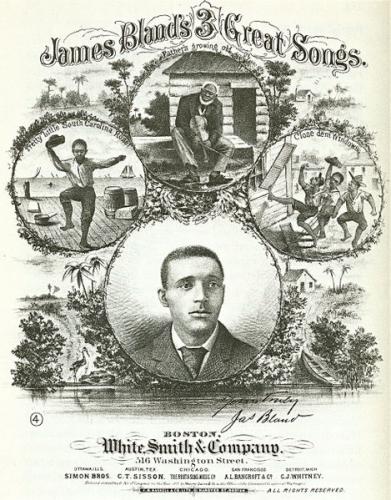James A. Bland was an entertainer and a prolific composer who wrote sentimental songs about the American South for use in minstrel shows. Bland was born in Flushing, New York on October 22, 1854 to educated, free parents. He briefly studied at Howard University in Washington, D.C., but inspired by the spirituals and folk songs he heard performed by ex-slaves working on the Howard campus, he soon abandoned academics in favor of a career in music. A self-taught banjo player, Bland initially sought work at clubs and hotels and then turned his attention to composition and minstrel entertainment.
In the late 1870s, Bland began his professional career as a member of the first successful all-black minstrel company, the Georgia Minstrels. Following the style of traditional all-white minstrel companies, such as the Virginia Minstrels, Bland’s company blackened their faces, painted on red lips, and used stereotypical exaggerated movements and dances in their shows.
Bland used the minstrel show as a platform for introducing his composed work. Inspired by the homesick sentiments expressed by his Howard classmate and future wife, Mamie Friend, he wrote a nostalgic ballad called “Carry Me Back to Old Virginny.” Published in 1878, it would become his best known song and marked his first major success as a composer. Almost thirty years after his death, Virginia adopted it as its official state song. (In 1997 Virginia retired the song and designated it “state song emeritus” due to controversy over its racial nature.) Bland wrote many other songs during his minstrel career, including “In the Morning in the Bright Light” (1879), “In the Evening by the Moonlight” (1879), “Oh! Dem Golden Slippers” (1879), “Hand Me Down My Walking Cane” (1880), and “De Golden Wedding” (1880).
Under the new leadership of Jack Haverly, the Georgia Minstrels grew into an established company, renamed the Minstrel Carnival of Genuine Colored Minstrels. They toured the Pacific Coast, and eventually performed in England in 1881. When Haverly’s show returned to the United States late in 1881, Bland chose to remain in England and lived in London for twenty years. While overseas, he played at command performances for Queen Victoria and the Prince of Wales in addition to performing in Scotland and Germany.
Bland returned to Washington, D.C. in 1901 but had no money and no friends. By the turn of the century, vaudeville had replaced minstrelsy as the leading genre in entertainment, and with the decline of the minstrel show, Bland lost his livelihood. He managed to find work at a law office and earned $250 for his last composition, a musical called The Sporting Girl. The exact number of songs Bland composed over his lifetime is unclear, with estimates falling anywhere between fifty-three and seven hundred different pieces of music.
James A. Bland died alone in Philadelphia on May 5, 1911 from tuberculosis. His death received little attention, and he was buried in an unmarked grave. In 1939, the American Society of Composers, Authors, and Publishers (ASCAP) located his burial spot and erected a headstone there to commemorate his life.

